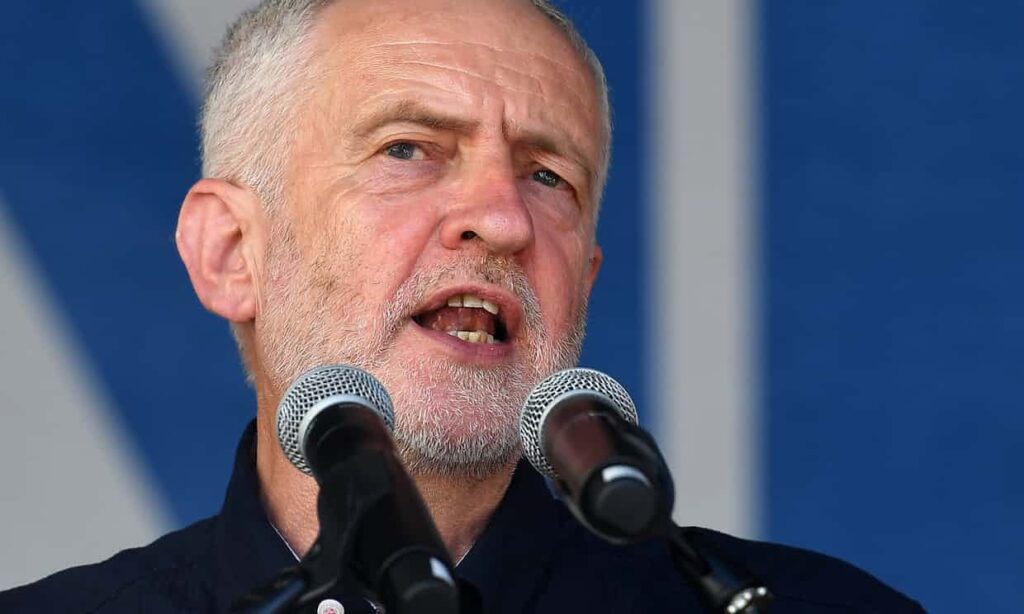Labour is planning a major shake-up of the corporate media; the corporate media respond with a smear
Jeremy Corbyn, Leader of the Labour Party, will set out ideas for “building a free and democratic media for the digital age” in the prestigious Alternative MacTaggart Lecture at the Edinburgh TV Festival tomorrow (Thursday) – so of course his enemies in the mainstream media have been looking for a way to undermine him.
Let’s look at the plans first – which are, let’s be honest, pretty good:
Mr Corbyn will argue that “we need bold, radical thinking on the future of our media” because of low levels of public trust and the impact of the digital revolution. Without major changes, he will say, a “few tech giants and unaccountable billionaires will control huge swathes of our public space and debate”.
The Labour Leader, who previously worked on the Newport and Market Drayton Advertiser and chaired the National Union of Journalists’ Parliamentary group, will argue that “a free press is essential to our democracy” but that journalists and media workers need to be “set free to do their best work, not held back by media bosses, billionaires or the state”.
Mr Corbyn will outline proposals for debate to expand and empower public interest journalism including:
- Strengthening Freedom of Information by ending ministerial vetoes and including private companies delivering public services;
- Giving charitable status to some local, investigative and public interest journalism;
- Creating an independent fund for public interest journalism paid for by tech giants;
- Expanding an existing BBC scheme to fund and develop local journalism.
Mr Corbyn will also outline his support for the BBC as a publicly owned, public service broadcaster and media organisation, which he will say is “a great institution which rightly commands a special place in our country’s story and national life”.
But, he will argue, we need to look at ways to democratise the BBC so it is freer from government influence, more accountable to the public and more representative of the country it serves.
On the BBC, Mr Corbyn will float a series of ideas, including:
- The election of some of the BBC board members by staff and licence fee payers, and the reduction or removal of the government’s powers of appointment
- Complete transparency about the diversity and make-up of the BBC workforce
- Placing the BBC on a permanent statutory footing to end government control through charter renewal
- The introduction of a digital licence fee, payable by tech giants or through internet service providers, to supplement the current TV licence fee and reduce the cost for poorer households.
On expanding FOI, Mr Corbyn is expected to say:
“I’m proud that one of the great tools that journalists can use to hold power to account, the Freedom of Information Act, was introduced by a Labour government.
“We have already said that we would expand the Act so it covers private sector providers of public services. It is simply not acceptable for corporate executives to hide behind the excuse of commercial confidentiality when they are meant to be providing – and as we’ve seen with Carillion, East Coast Mainline and Birmingham Prison this week so often failing – a public service.
“But I think we should be more ambitious. Currently, ministers can veto FOI releases. On two occasions, this veto has been used to block information about the UK’s decision to pursue military action against Iraq. That can’t be right. We will look at ending the ministerial veto to prevent the Information Commissioner being overruled.”
On the charitable status of public interest journalism, Mr Corbyn is expected to say:
“The best journalism takes on the powerful, in the corporate world as well as government, and helps create an informed public. This work costs money. We value it but somehow that doesn’t translate into proper funding and legal support.
“So, we should look at granting charitable status for some local, investigative and public interest journalism. That status would greatly help pioneering not-for-profit organisations, like the Bureau of Investigative Journalism, to fund their vital work through tax exemptions, grants and donations.”
On finding new funds to support public interest media, Mr Corbyn is expected to say:
“One solution to funding public interest media could be by tapping up the digital monopolies that profit from every search, share and like we make.
“Google and news publishers in France and Belgium were able to agree a settlement. If we can’t do something similar here, but on a more ambitious scale, we’ll need to look at the option of a windfall tax on the digital monopolies to create a public interest media fund.”
On supporting local and community media, Mr Corbyn is expected to say:
“This important part of the media, and its fantastic workforce, could be supported by reform and expansion of an existing BBC scheme, which sees ring fenced funding for ‘local democracy reporters’ employed in local papers.
“Part of these funds could be made available to local, community and investigative news co-ops, with a mandate to use significant time and resources reporting on public institutions, public service providers, local government, outsourced contractors and regulated bodies.”
On elections to the BBC board, Mr Corbyn is expected to say:
“One proposal would simultaneously reduce government political influence on the BBC while empowering its workforce and license fee payers. That would see some elections of places to the BBC Board, for example of executive directors by staff and non-executive directors by licence fee payers.
“To help decentralise the BBC, national and regional boards could be expanded, with election by BBC staff and local licence fee payers. All boards should be representative of the country, with a minimum representation for women and minority groups.”
On complete transparency of the BBC workforce’s makeup, Mr Corbyn is expected to say:
“The BBC could lead the way by setting best practice with complete transparency on the makeup of its workforce by publishing equality data, including for social class, for all creators of BBC content, whether in-house or external.”
On putting the BBC on a permanent, independent footing and the introduction of a digital licence fee, Mr Corbyn is expected to say:
“If we want an independent BBC, we should consider setting it free by placing it on a permanent statutory footing, with a new independent body setting the licence fee.
“The licence fee itself is another potential area for modernisation. In the digital age, we should consider whether a digital licence fee could be a fairer and more effective way to fund the BBC.
“A digital licence fee, supplementing the existing licence fee, collected from tech giants and Internet Service Providers, who extract huge wealth from our shared digital space, could allow a democratized and more plural BBC to compete far more effectively with the private multinational digital giants like Netflix, Amazon, Google and Facebook. This could also help reduce the cost of the licence fee for poorer households.”
The proposals have already found support among prominent members of the social media:
As an aspiring journalist, I completely support #ChangeTheMedia we need a free and democratic press without so much government and press baron influence. Journalism needs a better future.
— Aleesha 🇵🇸 (@a_leesha1) August 22, 2018
But the Establishment media have tried to undermine them, as part of the ongoing crusade against any hope of a government that supports the people, rather than exploiting them.
The gimmick chosen was to claim that Labour was refusing entry for news cameras into the lecture:
I'm hearing that for tomorrow's speech by Jeremy Corbyn about media freedom, news cameras are banned – "no room" we're told. Instead the organisers will distribute a transcript and video clips after the event. Wow! There's a good way to challenge people in power!
— Michael Crick (@MichaelLCrick) August 22, 2018
This quickly morphed into the following:
Labour have rung to say it's not their decision that news cameras are banned from tomorrow's Edinburgh TV festival lecture on press freedom by Jeremy Corbyn but the festival organisers, who are distributing their own video output. If so, the organisers should be ashamed. https://t.co/NDbQ51FEha
— Michael Crick (@MichaelLCrick) August 22, 2018
But even this is not strictly true. It seems the organisers have set up a direct feed to the World Wide Web, so people can watch the whole speech, unedited, with no media spin.
That, it seems, is the reason the TV news people are angry – with the full event publicly available, it will be impossible to spin an anti-Corbyn story out of it.
Of course, this proves the point he is making – that too few people, with too much money, have too much control over current affairs coverage, and too many opportunities to skew that coverage to their advantage.
They have done his job for him.
Visit our JustGiving page to help Vox Political’s Mike Sivier fight anti-Semitism libels in court
Vox Political needs your help!
If you want to support this site
(but don’t want to give your money to advertisers)
you can make a one-off donation here:
Here are four ways to be sure you’re among the first to know what’s going on.
1) Register with us by clicking on ‘Subscribe’ (in the left margin). You can then receive notifications of every new article that is posted here.
2) Follow VP on Twitter @VoxPolitical
3) Like the Facebook page at https://www.facebook.com/VoxPolitical/
Join the Vox Political Facebook page.
4) You could even make Vox Political your homepage at http://voxpoliticalonline.com
And do share with your family and friends – so they don’t miss out!
If you have appreciated this article, don’t forget to share it using the buttons at the bottom of this page. Politics is about everybody – so let’s try to get everybody involved!
Buy Vox Political books so we can continue
fighting for the facts.
The Livingstone Presumption is now available
in either print or eBook format here:
Health Warning: Government! is now available
in either print or eBook format here:
The first collection, Strong Words and Hard Times,
is still available in either print or eBook format here:
- ☕ Support Vox Political on Ko-fi or donate via PayPal
- 📘 Buy our books — political analysis and satire you won’t find elsewhere
- 📨 Join the mailing list for real headlines, direct to your inbox
- 🔗 Follow us on Facebook and Twitter/X
No Comments
Leave A Comment
you might also like
- ☕ Support Vox Political on Ko-fi or donate via PayPal
- 📘 Buy our books — political analysis and satire you won’t find elsewhere
- 📨 Join the mailing list for real headlines, direct to your inbox
- 🔗 Follow us on Facebook and Twitter/X
- ☕ Support Vox Political on Ko-fi or donate via PayPal
- 📘 Buy our books — political analysis and satire you won’t find elsewhere
- 📨 Join the mailing list for real headlines, direct to your inbox
- 🔗 Follow us on Facebook and Twitter/X
- ☕ Support Vox Political on Ko-fi or donate via PayPal
- 📘 Buy our books — political analysis and satire you won’t find elsewhere
- 📨 Join the mailing list for real headlines, direct to your inbox
- 🔗 Follow us on Facebook and Twitter/X











This is good.
Little spin allowed by The Main Stream Media.
At election time, why not give each of the parties with more then 10% of the national vote a mainstream paper? The Guardian for Labour, the Daily Express for Lib Dems, the Times for the Tories, the Sun for UKIP, ect. It would stop the press having massive power over the government of the day.
These are good proposals and long overdue. We must expect Murdoch and the other media liars to fight it with their usual dirty and dishonest tactics.
Brilliant! What a fantastic set of ideas to set the ‘cat amongst the pigeons’! The LameStreamMedia will be in all sorts of oxymorocin paroxysms trying to spin these set of proposed reforms, for sure.
Labour would do well to think up more plans to devolve power to the people.
When’s the election? The longer they drag it out, the more impatient people will become with this feckless (s)tory government, hah!
BBC TV Licence should be abolished as it fines mostly poorest women in England more than any other UK nation. Replaced entirely with tax on Sky, Amazon TV, Virgin and other satellite / cable UK TV to fund public broadcasting. It would be cheaper to do that for the BBC. And also then the money could be equally shared with the other public broadcaster Channel 4 who does not get any of the BBC TV Licence, which is anachronism from a prior age.
The ownership of the BBC should pass to Labour’s Representation Committee and of the Channel 4 to national Momentum, to forever end the stranglehold of rich men over the media. If you think the media has been lying about Jeremy Corbyn since he began Labour Leader in 2015, the media has been lying from very first basics about working class pensioners and the state pension for many many decades.
This is a fantastic and insightful policy by an truly inspired future leader.
Even his critics have to admit that even if they disagree with it, at least he’s trying to adddress a real problem rather than do what the current Government does which is simply sitting on their hands – as ever !
I’m not sure the govt are simply “… sitting on their hands, as ever … “. But I _am sure_ that they’re calling in ‘all hand on deck’ calling on their lamestreammedia to spin this in their favour – except that all fair-minded people will see it as the self-serving spin that it is.
The media barons at the BBC and news outlets have become too powerful, they decide what news we should be given. They don’t care, if that news is real or fake anymore this had let to the onslaught against Corbyn during the Election. They’re taking us all for mugs, some form of independent panel needs to fix this mess.
No wonder the MSM are angry – they’re being denied the opportunity to spin the narrative. Putting the event out, unexpurgated, to the WWW means we can put our own interpretation on it. That is the way to go :)
What’s happening with the two posts I made this morning, Mike?
I don’t know.
Mike – I believe my/our comments are being shadow-banned!
I see that my comments have all been posted now – but it took an inordinately long time which I don’t believe was down to Mike’s delay in OKing the posts. Namaste
There does appear to be problems getting comments on site, I found that Skwawkbox has also been having trouble posting on Facebook.